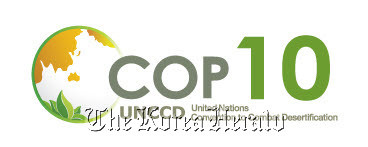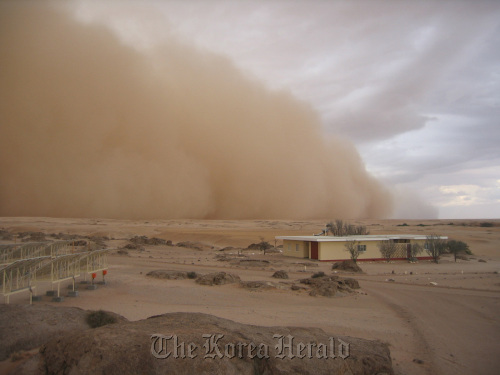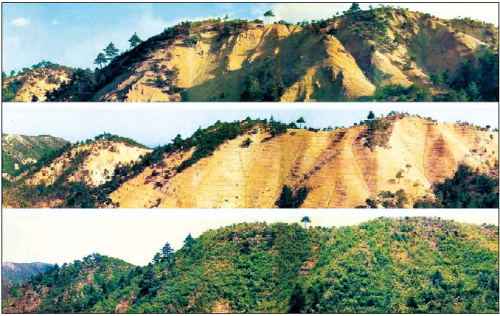Officials and experts from over 190 countries will gather in Korea for UNCCD conference
Ministers, senior government officials and experts from more than 190 countries will gather in Changwon, South Gyeongsang Province, next month to devise fresh plans to combat desertification.
The Korean government, the United Nations Convention to Combat Desertification and the United Nations Environment Programme will adopt the Changwon Initiative, a series of action plans the three will carry out for reforestation in Asia and Africa.

The 12-day symposium starting on Oct. 10, which is hosted by the Korea Forest Services, is the annual conference of the UNCCD and is the first of its kind in Asia.
“Korea plans to take the initiative in coming up with an action plan to fight desertification, and we’re going to highlight the impact of the devastating process on the world economy in the long run,” the KFS said.
The UNCCD is an agency affiliated with the United Nations and the world’s only legally binding convention created in 1997 to combat desertification.
“Changwon Initiative will basically be a partnership initiated by the KFS with the two U.N. agencies. It will have a long term plan for sustainable management of land and address vital issues of water shortage, food security and rural development,” the KFS said.
 |
Desertification in China (KFS) |
 |
Desertification in Namibia (KFS) |
The agency said it expects North Korea to take part in the UNCCD COP 10.
“We have sent an invitation to a North Korean agency participating in the United Nations events. They haven’t confirmed their participation yet but they are likely to attend the conference because North Korea is under a growing problem of desertification,” a KFS official said.
The impact of yellow dust storms from China and Mongolia on the Korean Peninsula is growing more severe every year. In the 1980s, yellow dust storms from Central Asia hit the Korean Peninsula for 3.9 days a year. This grew to 7.7 days in the 1990s and to 12.4 days in the 2000s.
No statistics have been compiled for North Korea but KFS estimates the communist country to have lost territory about 20 times the size of Seoul over the past decade due to desertification. North Korea has about 2.84 million hectares of wasteland as of 2008 after it let more than 32 percent of its forests be misused. The problem is especially alarming for North Korea since it has been carrying out massive land development projects and lost trees in the process.
 |
Korea’s three-step forestation process (KFS) |
Lee Don-koo, minister of the KFS, has been arguing that accelerating the process of forestation and restoration is imperative because arable lands are very difficult to restore once they turn to deserts.
Overgrazing, desertification and over-cultivation are reducing productivity of grains and increases poverty. About 6 million hectares of forestland, a size equal to all the forests in South Korea, is being destroyed in the world every year, the UNCCD said. About 24 million people have left their homeland due to desertification in the past 40 years.
Yellow dust from China and Mongolia is also a grave concern for their neighbors. Including related problems, yellow dust is estimated to cause 3.8 trillion won to 7.3 trillion won of damage to Koreans per year, Korea Environment Institute said.
“Korea stands at the right place to make such initiatives because it is the only country that has afforested wasted land in a short period of time and many countries need the know-how of doing that,” Lee said.
The UNCCD COP 10 will include a private sector forum on the sidelines. The KFS is hosting a conference titled “The Sustainable Land Management Business Forum” as part of the event, gathering business leaders from about 100 companies from home and abroad. Big international names including Unilever, Nestle, Cargil as well as local brands such as LG International, Yuhan-Kimberly, and Pigeon Corp. will take part in the business forum.
The two-day forum from Oct. 17-18 will discuss investments corporations will be making to restore waste land and the long term benefits of the process for global companies. Leaders will be able to explore business opportunities and encourage practices in dry land markets. Possible topics are how to improve the conditions of affected ecosystems and the living conditions of their populations. The forums aim to deliver ongoing dialogue between CEOs and policymakers, opinion leaders and environment activists.
“There is a limit to what government officials can achieve even with a detailed action plan. The forum needs innovative ideas, capital and expertise from the private sector to successfully execute the plans for combating desertification,” Lee said at a recent forum.
The UNCCD COP 10 will not only be the first Asian forum for the U.N. affiliate, but also the world’s first paperless business conference. A tablet computer will be offered to 194 member parties, free of charge.
By Cynthia J. Kim (
cynthiak@heraldcorp.com)







![[Herald Interview] 'Trump will use tariffs as first line of defense for American manufacturing'](http://res.heraldm.com/phpwas/restmb_idxmake.php?idx=644&simg=/content/image/2024/11/26/20241126050017_0.jpg)

![[Health and care] Getting cancer young: Why cancer isn’t just an older person’s battle](http://res.heraldm.com/phpwas/restmb_idxmake.php?idx=644&simg=/content/image/2024/11/26/20241126050043_0.jpg)

